Unlocking profitability in Borsa Istanbul: The impact of noncash credit and maturity breakdown of cash credit on corporate performance
IF 6.3
2区 经济学
Q1 BUSINESS, FINANCE
引用次数: 0
Abstract
Companies use either internal or external sources of financing to fund their operating or capital expenditure. When internal resources prove inadequate, businesses may turn to external financing options, such as issuing debt or equity in the capital market. In bank-dominated financial markets, cash credit is the primary funding source for most companies. In addition to cash credit, banks provide noncash credit instruments, such as letters of credit and letters of guarantee for international trading activities, obtaining working capital, or supporting participation in public and private tenders, for a fee. Surprisingly, prior research has not thoroughly explored the impact of noncash credit and the maturity breakdown of cash credit on corporate financial performance. Our study fills this gap by analyzing the effects of these factors on profitability of firms traded in Borsa Istanbul. The findings reveal a significant positive impact on firms' profitability of both noncash credit and long-term cash credit, but cash credit with shorter maturity does not significantly contribute to profitability. Moreover, financial risk, cash ratio, firm size, and inflation are identified as strong drivers of firms' financial performance. These findings have important implications for firms, banks, and regulators.
释放伊斯坦布尔证券交易所的盈利能力:非现金信贷和现金信贷期限细分对公司业绩的影响
公司利用内部或外部融资来源为其运营或资本支出提供资金。当内部资源不足时,企业可能会转向外部融资方案,如在资本市场上发行债务或股票。在银行主导的金融市场,现金信贷是大多数公司的主要资金来源。除现金信贷外,银行还提供非现金信贷工具,如用于国际贸易活动、获得营运资金或支持参与公共和私人招标的有偿信用证和保函。令人惊讶的是,以往的研究并未深入探讨非现金信贷和现金信贷的到期明细对企业财务绩效的影响。我们的研究通过分析这些因素对在伊斯坦布尔证券交易所交易的公司盈利能力的影响,填补了这一空白。研究结果表明,非现金信贷和长期现金信贷对企业的盈利能力有显著的积极影响,但期限较短的现金信贷对盈利能力的影响不大。此外,金融风险、现金比率、公司规模和通货膨胀被认为是公司财务绩效的主要驱动因素。这些发现对企业、银行和监管机构具有重要意义。
本文章由计算机程序翻译,如有差异,请以英文原文为准。
求助全文
约1分钟内获得全文
求助全文
来源期刊

Borsa Istanbul Review
Multiple-
CiteScore
7.60
自引率
3.80%
发文量
130
审稿时长
26 days
期刊介绍:
Peer Review under the responsibility of Borsa İstanbul Anonim Sirketi. Borsa İstanbul Review provides a scholarly platform for empirical financial studies including but not limited to financial markets and institutions, financial economics, investor behavior, financial centers and market structures, corporate finance, recent economic and financial trends. Micro and macro data applications and comparative studies are welcome. Country coverage includes advanced, emerging and developing economies. In particular, we would like to publish empirical papers with significant policy implications and encourage submissions in the following areas: Research Topics: • Investments and Portfolio Management • Behavioral Finance • Financial Markets and Institutions • Market Microstructure • Islamic Finance • Financial Risk Management • Valuation • Capital Markets Governance • Financial Regulations
 求助内容:
求助内容: 应助结果提醒方式:
应助结果提醒方式:


